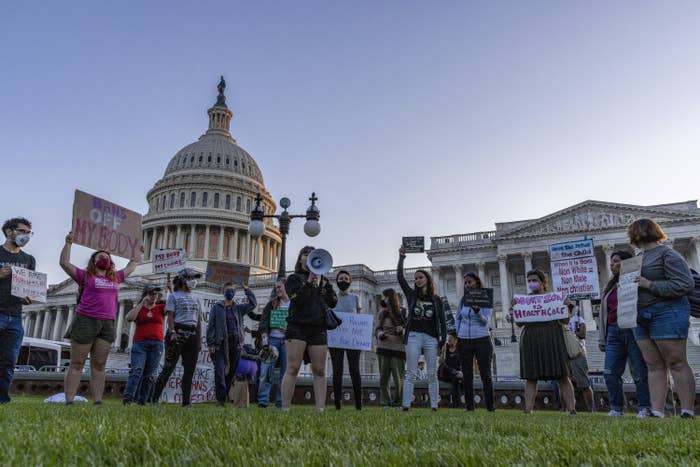
WASHINGTON — The Senate voted down a bill to codify the right to an abortion Wednesday as Democrats tried but failed to save Roe v. Wade before it is potentially struck down by the Supreme Court.
The Women’s Health Protection Act fell in a vote of 51–49, with all Republicans and one Democrat, Sen. Joe Manchin of West Virginia, voting against it. The outcome was expected, as 60 votes are required to overcome a Senate filibuster — the Senate rule that requires a supermajority to pass most bills — and Republicans are overwhelmingly opposed to preserving abortion rights.
The legislation would have struck down six-week and 20-week abortion bans, as well as other state-level provisions such as waiting periods and mandatory ultrasounds. The doomed vote was in response to a leaked Supreme Court draft ruling that would overturn Roe v. Wade, the landmark 1973 ruling that declared abortion access was a constitutional right. The draft is not final and the court could still choose to put forward a different ruling.
But Wednesday’s vote shows that despite controlling the Senate, the House of Representatives, and the White House, Democrats do not have the votes to stop the Supreme Court if it does ultimately choose to overturn Roe.
“This would be one of the worst and most damaging cases in the entire history of the Supreme Court,” said Senate Majority Leader Chuck Schumer before the vote. “Today it will be Roe, tomorrow it will be a national ban on abortion.”
Sen. Joe Manchin of West Virginia was the only Democrat to vote against the bill. Manchin told reporters he supports codifying abortion rights, but he believes the Women’s Health Protection Act goes beyond that and would expand abortion access. If passed, the bill would supersede abortion restrictions on the books in several Republican-run states.
“I would vote for Roe v. Wade codification if it was today. I was hoping for that,” Manchin said.
The two pro-choice Republican senators — Susan Collins of Maine and Lisa Murkowski of Alaska — also voted against the bill citing the same reasons as Manchin. Collins released a statement saying she and Murkowski support preserving the status quo, but not striking down current abortion laws in red states.
Murkowski told reporters that she voted against the bill because it goes “far beyond” codification of Roe, which she supports. “I want to ensure (the right to an abortion) but I also respect that there are reasonable limitations that should be allowed,” she said.
The Women’s Health Protection Act would write into law that healthcare providers have a statutory right to provide abortion services and their patients have a corresponding right to receive them. It would strike down any state laws that prohibit abortion procedures “at any point or points in time prior to fetal viability,” as well as laws that prohibit abortions after fetal viability if continuing pregnancy would put the health of the pregnant person at risk.
A previous attempt to pass the bill failed in early March. Sen. Bob Casey, one of the few Democratic lawmakers in Congress who hold conservative abortion views, reversed his position and voted for the bill Wednesday. Casey’s father, former Pennsylvania governor Bob Casey Sr., famously fought abortion rights all the way to the Supreme Court. This led to Planned Parenthood v. Casey, which along with Roe became a key pillar of jurisprudence upholding abortion access for the past five decades.
Casey said in a statement that “the circumstances around the entire debate on abortion have changed.”
Democrats and reproductive rights advocates now have to hope that the Supreme Court changes its mind. They’ve led a public pressure campaign to that end, but the court has a solid 6–3 conservative majority after Donald Trump managed to successfully appoint Neil Gorsuch, Amy Coney Barrett, and Brett Kavanaugh to the court. Those three reportedly make up the bulk of the five-judge majority supporting the draft decision.
“I’m scared and I am frightened for women in this country more than I ever have been before,” said Democratic Sen. Patty Murray shortly before the failed vote.
Democrats are planning to make the fight over abortion rights a major issue in the upcoming midterm elections. Overturning Roe is broadly unpopular and has been for decades, but Republicans say they expect the performance of the Biden administration to be a far bigger factor.
“(Overturning Roe) might be broadly unpopular, but it’s not a top-five issue, I don’t think, to people who are going to decide the election,” said Sen. Kevin Cramer, who voted against the bill Wednesday. “I don’t think it’s the issue that drives voters like it maybe once was.”

